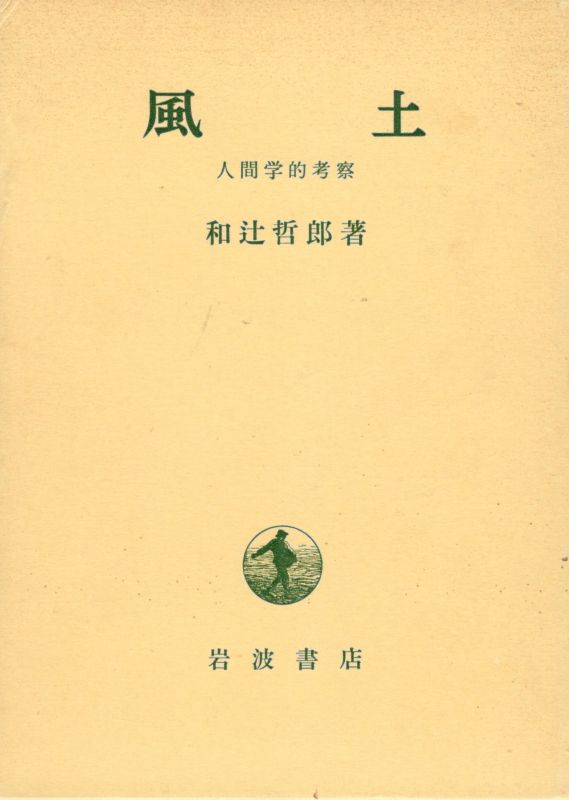Watsuji, Fudo ningengakuteki kosatsu (Climate, an Anthropological Consideration)
Fudo ningengakuteki kosatsu (Climate, an Anthropological Consideration)
Iwanami Shoten, [c.1980] 22.2cm x 15.8cm. 253 pages. Original Hardcover with original slip case. Very good condition with only minor signs of external wear. From the library of philosopher Graham Parkes.
Tetsuro Watsuji (March 1, 1889 – December 26, 1960) was a Japanese moral philosopher, cultural historian, and intellectual historian.
Watsuji was born in Himeji, Hyogo Prefecture to a physician. During his youth he enjoyed poetry and had a passion for Western literature. For a short time he was the coeditor of a literary magazine and was involved in writing poems and plays. His interests in philosophy came to light while he was a student at First Higher School in Tokyo, although his interest in literature would always remain strong throughout his life.
In his early writings (between 1913 and 1915) he introduced the work of Søren Kierkegaard to Japan, as well as working on Friedrich Nietzsche, but in 1918 he turned against this earlier position, criticizing Western philosophical individualism, and attacking its influence on Japanese thought and life. This led to a study of the roots of Japanese culture, including Japanese Buddhist art, and notably the work of the medieval Zen Buddhist Dogen. Watsuji was also interested in the famous Japanese writer Natsume Soseki, whose books were influential during Watsuji’s early years.
In the early 1920s Watsuji taught at Toyo, Hosei and Keio universities, and at Tsuda Eigaku-juku. The issues of hermeneutics attracted his attention. In 1925 Watsuji became professor of ethics at Kyoto University, joining the other leading philosophers of the time, Nishida Kitaro and Tanabe Hajime. He then moved to the Tokyo Imperial University in 1934 and held the chair in ethics until 1949.
During World War II his theories (which claimed the superiority of Japanese approaches to and understanding of human nature and ethics, and argued for the negation of self) provided support for Japanese nationalism, a fact which, after the war, he said that he regretted. Watsuji died at the age of seventy-one.
Watsuji’s three main works were his two-volume 1954 History of Japanese Ethical Thought, his three-volume Rinrigaku (Ethics), first published in 1937, 1942, and 1949, and his 1935 Fudo. The last of these develops his most distinctive thought. In it, Watsuji argues for an essential relationship between climate and other environmental factors and the nature of human cultures, and he distinguished three types of culture: pastoral, desert, and monsoon. (Wikipedia)
- Language: Japanese
- ISBN: 4000019511
- Inventory Number: 42931AB
EUR 68,--
© 2025 Inanna Rare Books Ltd. | Powered by HESCOM-Software










